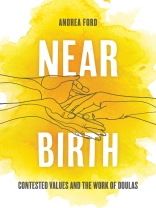This insightful study of contemporary birthing uses the work of doulas to explore the questions raised near birth: What do we value, and how do we navigate those values when they are tangled in conflict?
Pregnancy, birthing, and infant care offer a microcosm of cultural debates. In this ethnography of childbearing in Northern California, Andrea Ford examines how people’s birthing decisions and experiences relate to and construct the American ideal of the individual through the values of progress, experience, autonomy, equality, authenticity, immunity, and redemption.
Both an anthropologist and a doula who has observed and participated in dozens of births, Ford explores how parents, practitioners, activists, laws, technologies, media, and medical institutions shape the politics of care.
Near Birth shows that questions about the best way to have a baby concern much more than health procedures. In the answers lie often-unacknowledged claims about what kinds of personhood matter and what ways of living are valued and valuable.
สารบัญ
Contents
Acknowledgments
Introduction: On Becoming an Individual
1 • Progress: California as Both Utopia and Dystopia
2 • Experience: Ways of Knowing, Being, and Doing Physiology
3 • Autonomy: Negotiating Trust and Control in the Birth Room
4 • Equality: Social Reproduction and Gendered Responsibility
5 • Authenticity: Technology, Nature, and Time
6 • Immunity: Ecological Anxieties about Chemicals, Microbes, and Stress
7 • Redemption: Activism and Imagined Futures
Conclusion: Fears and Fantasies
Notes
Bibliography
Index
เกี่ยวกับผู้แต่ง
Andrea Ford is a Wellcome Trust Research Fellow in Humanities and Social Sciences at the University of Edinburgh and coeditor of Hormonal Theory: A Rebellious Glossary.












